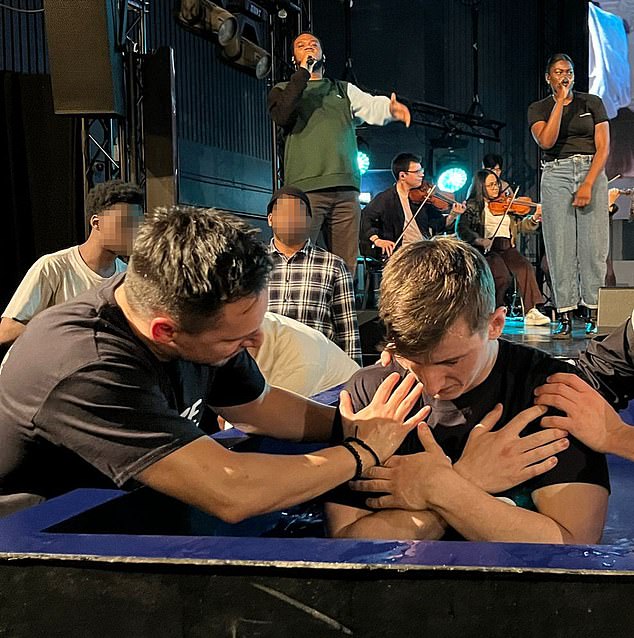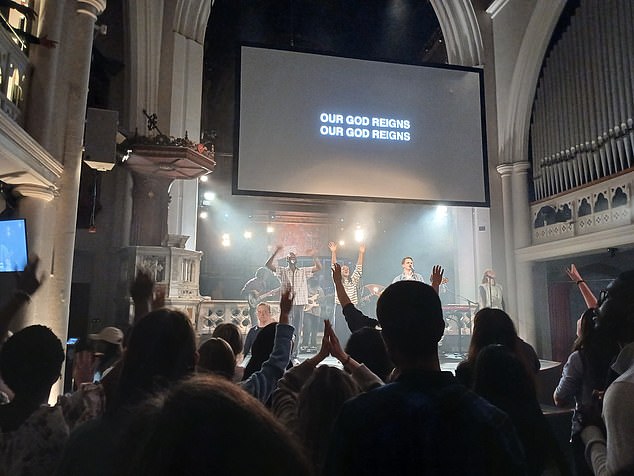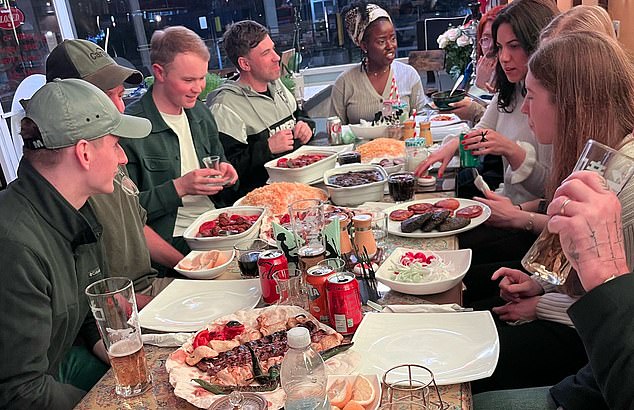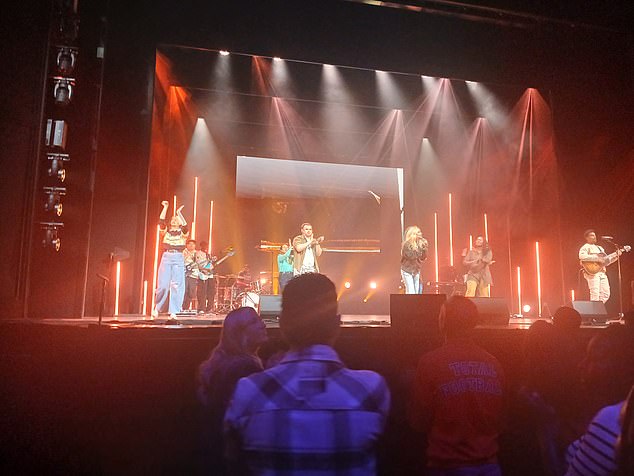Aged 14, I remember laughing along as atheist Richard Dawkins destroyed Al Jazeera’s Mehdi Hasan – argumentatively speaking.
I was on YouTube, watching the pair thrash it out at the Oxford Union over the question, ‘Is religion good or evil’. Dawkins came on top in my eyes, arguing that theists might as well believe in leprechauns.
Yet, 12 years later, I was standing inside an evangelical church, hands above my head, wailing, ‘Your name cannot be overcome!’ Referring of course to Jesus Christ, The Messiah, The Son of God.
I was attending my own baptism, singing in worship before being dunked underwater by a charismatic pastor and one of my close faith friends. At least 90 more were baptised that same night.
I’m just one of thousands of Gen-Zers, born after 1995, who has been persuaded by the pull of religion in recent years.
So how did I get here, why is my generation flocking back to faith? What on Earth is happening?
I had a dark night of the soul last year when I questioned everything.
I realised I detested the very Gen-Z foundations upon which my life was based on: getting validation online, trying to be handsome enough for Instagram, trying to fit in. Plus the weird obsession with turning a hobby into a ‘side hustle’.

Luke Whelan attending his baptism, singing in worship before being dunked underwater by a charismatic pastor alongside 90 others that day

One recent Bible Society study reports that church attendance shot up 56 per cent between 2018 and 2024, thanks mostly to the younger generations
I was miserable and, that night, decided to pray.
Although I’d been to Catholic Mass as a young child, my exposure to spirituality was limited. Yet, there I was, on my knees encountering faith.
I didn’t know who or what I was grovelling to, but I just spoke. I blurted out my anguish and anxieties – and that gave me a sense of peace and ease.
Shortly after, I felt an urge to attend my first service, opened Google, and found myself at a modern, charismatic, evangelical church. I’ve been going ever since.
My story isn’t unique. Many in GenZ are seeking metaphysical answers – and there’s evidence of a quiet revival taking place in the UK.
One recent Bible Society study reports that church attendance shot up 56 per cent between 2018 and 2024, thanks mostly to the younger generations.
The research, based on YouGov polling, found that 18 to 24-year-olds are now the second most likely group to be in church, with a jump from 4 per cent attendance in 2018 to 16 per cent in 2024, tailing just behind the post-war ‘boomer’ generation.
But, not all churches are growing a Gen Z following at the same rate, with the Anglican Church lagging behind. The study found people this age are more likely to be Roman Catholic or Pentecostal than the Church of England.
Almost a third of C of E parishes, where the pews are filled with boomers and Gen X (those born between 1965 and 1981) have reported they have ‘zero children’ in the congregation.
From what I’ve seen first-hand, the individual churches that make a real effort to connect deeply with Gen Z problems such as identity and low self-esteem – bring the solution of Christ in a punchy, charismatic and frankly enjoyable way – are thriving.

Every couple of weeks, Luke meets a small group from Hillsong to eat good food, read the Bible and share any personal growth

The research, based on YouGov polling, found 18 to 24-year-olds are now the second most likely group to be in church, a jump from 4 per cent attendance in 2018 to 16 per cent in 2024
Holy Trinity Brompton (HTB), in West London, is always rammed with people my age. There, the pastors are able to connect the bible to my own modern-day experiences.
Enthusiastic, non-denominational Hillsong Church, which baptised me at its North London location, is also doing a huge amount of evangelising. Five London locations alone, baptise around 500 people each year.
I’m exhausted by the Gen Z philosophy of ‘Me’. Of such stress-inducing ideas as, ‘I must look, feel and be perfect’ and ‘what I want is all that matters and I’ll only be okay when I get it’.
I spoke to Nicky Gumbel CBE, 69, who is a former pastor at HTB and the founder of Alpha, a ten-week introduction to Christianity course that has now been completed by 32million people across 100 countries.
The misery, depression, anxiety and angst of Gen Z, he explained to me, has left a God shaped hole. It’s no surprise that the average age of people on the Alpha course is 18 to 35.
I believe I’m part of what psychologists now call ‘The Anxious Generation’, a phrase coined by social psychologist Jonathan Haidt.
We have been badly damaged by the fast-developing virtual world and are, for the most part, unable to cope with real life. In other words, we’re nervous wrecks.
Haidt writes that, today, ‘We have an entire generation that has been deprived of the normal psychological nutrients of childhood – free play, risk-taking, and unstructured socialisation’.
My childhood was standard for a British boy born in 1997. In other words, chronically behind a screen.
Any discomfort or unease could be quelled by virtual reality: Logging onto MSN then Facebook, Minecraft, sharing memes, creating memes, scrolling on Instagram and texting – and (for a breath of fresh air) Rugby on a Sunday.
Aged eight, I received my first video game console. As I unwrapped my Playstation 2 for Christmas, my parents beamed. They were happy that I was happy.
By the age of 12, I was onto Playstation 3. By 15, I was a goner. Real life was a break from the online world, rather than the other way around.
I naively believed I was having fun, unaware that I was destined for an early adulthood filled with feelings of isolation.
Because I spent so much time in an alternative universe – thrilling, addictive and novel – I didn’t want to spend time in the real world.
It’s not our fault. We didn’t choose the environment we were born into, a world of overabundance and instant gratification, where the gap between what you fancy and what you have to do to get it appears unbelievably narrow.

Luke found meaning through service, connection through friendship, peace through surrendering to a higher power
We’re plagued by the desire to be important and perfect – to impress the ever-judging eyes of social media. We self-consciously measure then tweak our own behaviour. Frankly, it’s just awful.
I don’t write this with any self-pity, rather with a kind of melancholy about the Brave New World we’ve inherited that Aldous Huxley predicted so well in his 1932 novel. Almost every single person in my circle knows someone who has suffered mental health problems or has suffered themselves.
Yet Gen Z is far from doomed, as I have discovered for myself.
Church, alongside professional therapy, has helped me meet my needs in a healthy way.
I have found meaning through service, connection through friendship, peace through surrendering to a higher power.
The message that I am loved unconditionally and eternally by an ever-present source of healing is pretty cool too.
I no longer obsess about the outcomes of my life or the ‘what ifs’. Instead, I can focus on my own actions and trust my life will work out because God has a plan.
When I went to a Hillsong service at the Dominion Theatre last year and saw the big screen outside saying ‘Welcome Home’, I could feel just how much love there was. It was shocking to me.
Hillsong, previously a favourite for celebrities, is known for attracting a lot of young worshippers. Every Sunday, I have a fantastic time, enjoying coffee afterwards and learning from others about my new-found faith. I’ve made some friends for life.
It certainly beats the loneliness of spending hours online.
Alongside its wider vision of creating a healthy church, Hillsong’s central London congregation has a focus on growing strong male role models. It seeks to foster responsible God-fearing men with respect for family and community.
Every couple of weeks, I meet a small group from Hillsong to eat good food, read the Bible and share any personal growth.
I believe that the era when atheism spread unabated among the young is over.
Times have changed. Social media video has become the modern Gutenberg printing press – a chance for the Gospel to spread to the young at a speed never seen before.
Viral celebrities and influencers with broad Gen Z appeal are leading the way with this very 2025 form of evangelism.
Stormzy, Bukayo Saka, Matthew McConaughey, Shia LaBeouf, Peter Crouch and Bear Grylls are just a few who’ve spoken openly about their faith online.
It might seem an irony, but Gen-Z’s chronic onlineness increases the chance to hear the word of God, at some point, on somebody’s profile, somewhere.
I used to watch Richard Dawkins tear through believers and think, ‘God doesn’t stand a chance’.
But maybe that’s the real miracle: that despite the memes, debates, doubt, and digital noise, God still found a way through.
And now, instead of laughing at the faithful, I sing among them – hands raised, eyes open.







